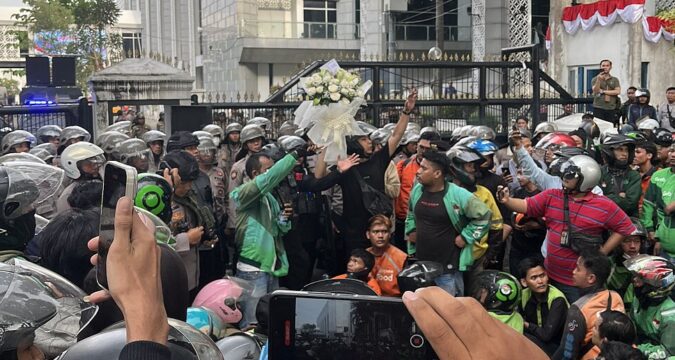
JAKARTA (AsiaNews): Ignatius Cardinal Suharyo of Jakarta, Indonesia, called for “national repentance” as a means to address the numerous challenges confronting the country. Indonesia has recently been rocked by widespread protests and unrest, which the president, Prabowo Subianto, vowed to suppresd.
On September 3, Cardinal Suharyo addressed a press conference attended by leading representatives from diverse religious backgrounds and academic institutions, all united under the banner of the National Conscience movement.
The cardinal emphasised how the country today must have the courage to acknowledge its weaknesses and mistakes in every branch of government.
“Let us carry out national repentance. That, in my view, is what is most needed right now. Otherwise, I don’t know what direction we are heading,” he said.
In the press conference at the Gerakan Nurani Bangsa [National Consciousness Movement], the cardinal warned that an attitude of denial would only keep the nation at an impasse. “If we deny [our problems], we will get nowhere,” he stressed.
Cardinal Suharyo also highlighted the constructive criticism and ideas often expressed by academics, public figures, and civil society groups. However, he noted that such voices often end up being mere words.
“My request is this: please listen to the thoughts, ideas, and proposals— especially from academics who have no other interest except love for the homeland. Let them be heard, considered, and seriously reflected upon together,” he said.
Let us carry out national repentance. That, in my view, is what is most needed right now.
Cardinal Suharyo
In closing, the cardinal reminded those present of the country’s founding ideals and the vision of “Indonesia Emas 2045” [Golden Indonesia 2045]. He explained that these aspirations can only be realised if the country is honest in assessing its current conditions and has the courage to repent, joining forces for a common goal.
Led by university students, workers, and rights groups, the protests which began on August 25—triggered by a cost-of-living crisis and revelations that members of the House of Representatives were receiving excessive housing allowances—spread across much of the country.
On September 4, representatives of student movements, workers, and civil society groups gathered in front of the Parliament building declaring that the focus of the protest was “corruption and the politicisation of the law.”
Police heavy-handedness has only fuelled the unrest and, according to human rights groups, has resulted in at least 10 deaths and a thousand people injured, with incidents of looting and rioting.
In an open letter to Subianto, the National Conscience movement highlighted concerns and requests, starting from an ethical and non-partisan perspective, aimed at strengthening Indonesia’s spirit and ideals.
Police heavy-handedness has only fuelled the unrest and, according to human rights groups, has resulted in at least 10 deaths and a thousand people injured, with incidents of looting and rioting
The letter said that the value of humanity and alignment with the people’s directives, which must become the “foundation and the main orientation” in formulating state policies.
This requires a stop to acts of violence and repression against demonstrations, which are part of freedom of opinion and expression.
It then called for ethical and empathetic leadership, especially if people are angered and frustrated when they see members of the ruling elite—in the executive, judiciary, legislative, and even law enforcement—show insensitivity towards the suffering of parts of the country.
Priorities include police reform, economic stability, and a strengthening of welfare, not to mention cutting the privileges of the ruling elite that bloat public spending. This also requires enforcing a virtuous principle of “transparency” in the allowances and benefits for public officials.
The National Conscience movement is backed by men and women, Christians and Muslims, politicians and intellectuals, religious leaders and activists like former Indonesian first lady, Sinta Nuriyah Abdurrahman Wahid, Kiai Hajj Ahmad Mustofa Bisri, Cardinal Suharyo, Jesuit Father Franz Magnis-Suseno, Bhikkhu Pannyavaro Mahathera, Reverend Gomar Gultom, Makarim Wibisono, Komaruddin Hidayat, and Slamet Rahardjo.
The open letter goes on to call for upholding the principle of civilian supremacy in democratic governance, while simultaneously boosting the professionalism of the armed forces and the police, so that they can focus on their tasks and functions.
This is coupled with the need to build up public awareness persuasively, encourage mutual care among citizens, and reject violence, destruction, and looting.
The letter touches on religious leaders, cultural figures, academics, and leaders of places of worship, who are urged to pray continuously and work actively “for the safety of our beloved nation”.



